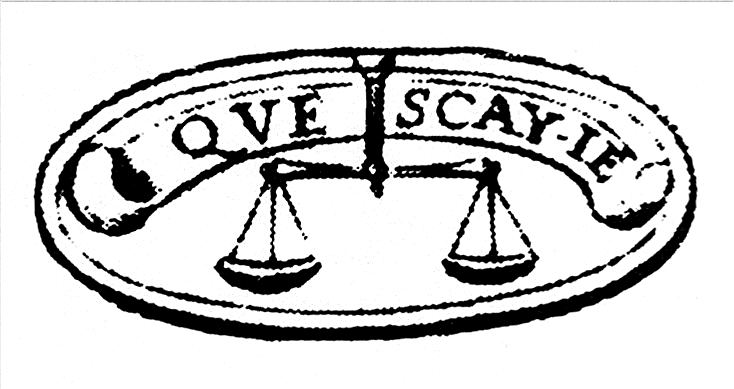Why Profound Living “Essays”?
“The essayist is a self-liberated man, sustained by the childish belief that everything he thinks about, everything that happens to him, is of general interest…only a person who is congenitally self-centered has the effrontery and the stamina to write essays.”
~E.B.White, Foreword to Essays of E.B. White , p. vii
I prefer to call these Profound Living pieces “essays” rather than blog posts - though it’s probably just an affectation. They are written in the spirit of essayists like E.B. White and, of course, the person responsible for the term “essay”, Michel de Montaigne.
Montaigne famously used the French term essai , which means “trial” to describe his writings. The term “essay” comes from this. He described these short works:
"For these trials, therefore, which I am making of it, I take advantage of every kind of occasion. If there is a subject that I do not understand I try it out for that very reason, sounding the ford from a distance; and if I find the water too deep for my stature, I keep to the bank. And this power of knowing when it cannot cross is a part of its efficacy – indeed that part of which it is proudest. Sometimes, with a vain and insubstantial subject, I try to see whether my judgement can find some way to give it body, something on which to prop and support it. At other times I address it to some noble and outworn theme, in which it can make no discoveries of its own, the road being so well-worn that it can only walk in others’ footsteps. In that case it plays its part by choosing the track that seems to it best; out of a thousand paths it says that this one or that one is the best choice.
I take the first subject that chance offers me. All are for me equally good. And I never set out to cover them completely. For I never see the whole of anything; nor do those who promise to show it to us. Of the hundred parts and aspects that each thing has, I take one, sometimes merely licking it, sometimes scraping its surface, and sometimes pinching it to the bone. I stab it as deeply, but not as widely as I can; and I generally like to seize it from some unaccustomed viewpoint. If I knew myself less well, I should take the risk of treating some subject thoroughly. But since I scatter a word here and a word there, samples torn from their piece and separated without plan or promise, I am not bound to answer for them, or to keep to them, but can change them when it suits me. I am free to give myself up to doubt and uncertainty, and to my predominant quality, which is ignorance."
~Michel de Montaigne, Montaigne Essays , pp. 130-131
I like what Montaigne wrote to the reader at the beginning of his essays:
"This, reader, is an honest book. It warns you at the outset that my sole purpose in writing it has been a private and domestic one. I have had no thought of serving you or of my own fame; such a plan would be beyond my powers. I have intended it solely for the pleasure of my relatives and friends so that, when they have lost me – which they soon must – they may recover some features of my character and disposition, and thus keep the memory they have of me more completely and vividly alive.
Had it been my purpose to seek the world’s favor, I should have put on finer clothes, and have presented myself in a studied attitude. But I want to appear in my simple, natural, and everyday dress, without strain or artifice; for it is myself that I portray. My imperfections may be read to the life, and my natural form will be here in so far as respect for the public allows. Had my lot been cast among those peoples who are said to live under the kindly liberty of nature’s primal laws, I should, I assure you, mostly gladly have painted myself complete and in all my nakedness.
So, reader, I am myself the substance of my book and there is no reason why you should waste your leisure on so frivolous and unrewarding a subject.
Farewell then, from Montaigne, this first day of March, 1580."
~Michel de Montaigne, Montaigne Essays , p. 23
There is one other legacy that Montaigne left behind that resonates with me. In 1576, he had a medal made which said Que scais-je?, which means, “What do I know?”. As translator J. D. Cohen writes in his introduction, “He had come to recognize by experience and reading that the intellect was powerless to discover those truths about which he was most curious…what passed as truth was often a matter of climate and upbringing, of passion and prejudice, depending entirely on the inquirer’s viewpoint” (p. 10).
Usually, using long quotations in a manuscript means the author is having a hard time thinking for him or herself. I generally become bored reading them, and I apologize here if that has been the case with our good friend Montaigne. Still, I believe he lays out his intent better than I could try to recreate for you, hence, these.
Next are the most relevant aspects of essay writing I take here from Montaigne, applied to writing for Profound Living .:
First , these essays are above all “trials”, explorations, and stabs at truths as I think I might know them now. The ideas or principles or advice (hopefully not too much of that) have emerged from my experience and reflection, but may well change or evolve as I continue to experience and reflect.
Second , although some may perceive hubris in my writing – just writing about one’s views and oneself has to carry a self-centered overconfidence – Montaigne’s Que scais-je?, or “What do I know?” embodies the realization that what I think I know is founded in my “climate and upbringing, of passion and prejudice, depending entirely…” on my own viewpoint. I know from the outset, as any reader will quickly realize, that I have incomplete knowledge and skewed opinions and perspectives. So, my writings are a humble putting-forth of what I know to be imperfect and that others will see, correctly, as imperfect. I lay them out, regardless, in the event one or more might find interest.
Third, as with Montaigne and White, many of these essays will be about me, my life, and what I think is important, with the goal of trying – as much for myself as for anyone – to understand what it means to live each day more meaningfully, more deeply, more joyously, and more usefully. In short, more profoundly. By writing, I am forcing all the ideas and thoughts and feelings that whirl through my head to be expressed on a piece of (digital) paper, and then to make some sense of them. Writing compels me to take a position, even if the position is that I don’t know my position yet. Consequently, through story or reflection or questioning, these essays will be unavoidably personal and necessarily subjective.
Fourth, “…I want to appear in my simple, natural, and everyday dress, without strain or artifice; for it is myself that I portray…” as Montaigne intended for himself. I know myself well enough to know that overly often I will err on the side of my own ego, of attempting to establish myself as better than I am. At least it is with a humble spirit that I take this project on.
Finally, I do not know what I will be writing about. There are so many topics related to profound living – it is, after all, related to the entire human experience – that I will “…take the first subject that chance offers me. All are for me equally good.”
Let the trials continue.
References:
Cohen, J. M. (1959). Introduction. Montaigne Essays (pp. 9-21). Harmondsworth, Middlesex; Baltimore: Penguin Books.
Montaigne, M. d. (1959). Montaigne Essays (J. M. Cohen, Trans.). Harmondsworth, Middlesex; Baltimore: Penguin Books.
White, E. B. (1977). Essays of E.B. White (1st ed.). New York: Harper & Row.
For a little more about Montaigne:
From the Stanford Encyclopedia of Philosophy: https://stanford.io/2G3cswI
From Oregon State’s “Great Philosophers”: http://bit.ly/2G3JME6
Montaigne On Trial, Adam Gopnik, The New Yorker : http://bit.ly/2G3I5GC
For a little more about E.B. White:
Biography, E.B. White: http://bit.ly/2I1xSXD
Missing E.B. White, Roger Angell, The New Yorker: http://bit.ly/2pGckbF
To receive all our Profound Living posts, please subscribe (it won’t cost you anything but time to read): https://www.profoundliving.live/
Also, please consider following the Profound Living Facebook page at: http://bit.ly/2Lv44W6
Also, please share this essay with others who might find it beneficial.












